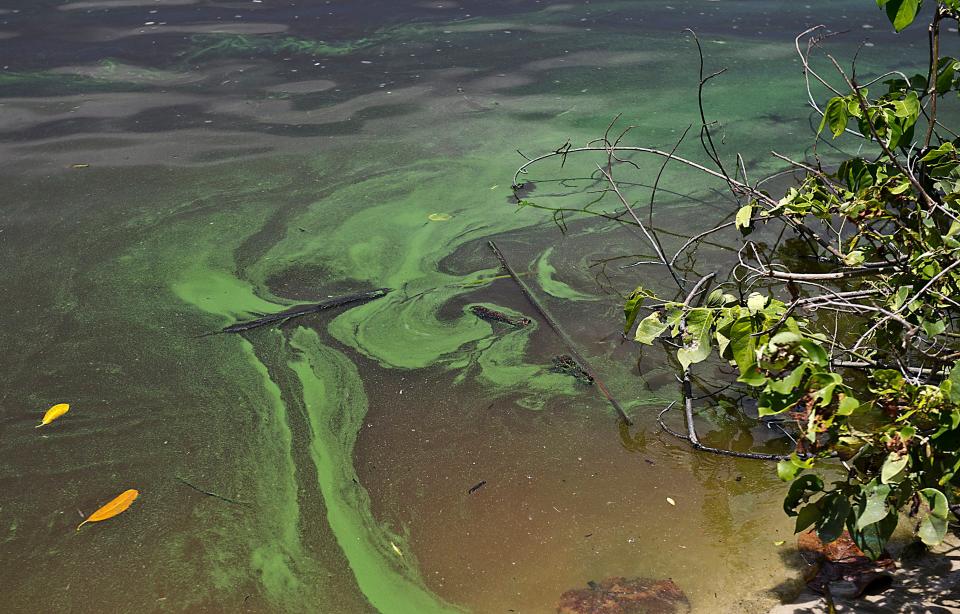Stuart, 5 nonprofits urge EPA to set toxic algae standard as FL ignores water quality laws
The battle against toxic algae in Florida waterways is moving from the state to the federal level.
The city of Stuart, the nonprofit Friends of the Everglades and four other environmental advocacy organizations plan to file a petition May 23 urging the Environmental Protection Agency to set numeric criteria for cyanotoxins.
If the EPA did that, the agency could — using laws already in the Clean Water Act — force Florida to regularly sample waterways for harmful toxins and enforce state pollution laws through programs such as the Basin Management Action Plan. It also could prevent toxic algae from being discharged into the St. Lucie River.
EPA criteria could help water managers plan, protect and restore watersheds prone to toxic algae such as Lake Okeechobee, the St. Lucie and Caloosahatchee rivers, and Blue Cypress Lake in Indian River County.
TCPalm investigation: State's own data proves pollution prevention is not working
The point of the petition is to improve human health protection when it comes to standards for drinking water, recreation, boating, fishing and swimming, as well as fish and wildlife protection, said Jason Totoiu, a Martin County native and lead attorney for the Center for Biological Diversity, which is leading the effort.
"Numeric cyanotoxin criteria will help protect and restore water quality in the state. They serve as quantifiable metrics for how well the state is doing in reducing algal blooms, providing true transparency and accountability," he said.
The EPA is expected to take a few months to complete a thorough review, he said.
"The agency has already done a tremendous amount of research and decided it's in the nation's best interest to have guidelines in place," Totoiu said.
The Florida Department of Environmental Protection is not required to accept the cyanotoxin standards the EPA established in 2019, but it is required to explain why it hasn't, which it has not done, the petition says.

The petition also compels the state to provide more complete human health advisories sooner. DEP tests waters only when there are visible blooms. Cyanotoxins often can be in the water even when the bloom isn't visible. Regular testing — as many other states already do — would give DEP real-time information, Totoiu said.
Stuart City Manager Mike Mortell said EPA criteria could help the city combat Lake Okeechobee discharges, which can carry potentially toxic cyanobacteria, commonly called blue-green algae, in the St. Lucie River.
"The city of Stuart does not have the benefit of regulating discharges, but it does suffer significant damages and impacts when the blue-green algae destroys the river. (EPA criteria) would give the city standing to challenge discharges from Lake Okeechobee; but more importantly, the hope is that it would prevent the Army Corps (of Engineers) from even discharging the polluted water into the St. Lucie in the first place," Mortell said.
The petition cites five years when the Army Corps discharged algae-laden water from Lake O into the St. Lucie and Caloosahatchee rivers: 2003, 2008, 2013, 2016 and 2018. According to federal law, the Army Corps is responsible for the quantity of water in the Lake O-Everglades system, but the state is responsible for the quality of that water.
"We're entering peak algae season in Florida, when hot temperatures and polluted waters create fetid conditions ripe for toxic algae blooms. Those of us who were living in Stuart in 2016 and 2018 vividly remember the toxic algae that fouled the St. Lucie River and Indian River Lagoon — and the damage inflicted on our economy, environment, public health and recreation," said Eve Samples, executive director of Friends of the Everglades based in Stuart. "Florida has not curtailed the underlying pollution that led to those lost summers, and this petition seeks to bring overdue protections to residents and the waters we cherish and rely upon."
Joining the petition are the Calusa Waterkeeper, the Florida Wildlife Federation and the Sanibel-Captiva Conservation Foundation.
Ed Killer writes about the environment for TCPalm. Email him at ed.killer@tcpalm.com.
This article originally appeared on Treasure Coast Newspapers: Stuart and 5 nonprofits urge EPA to set toxic algae standard

